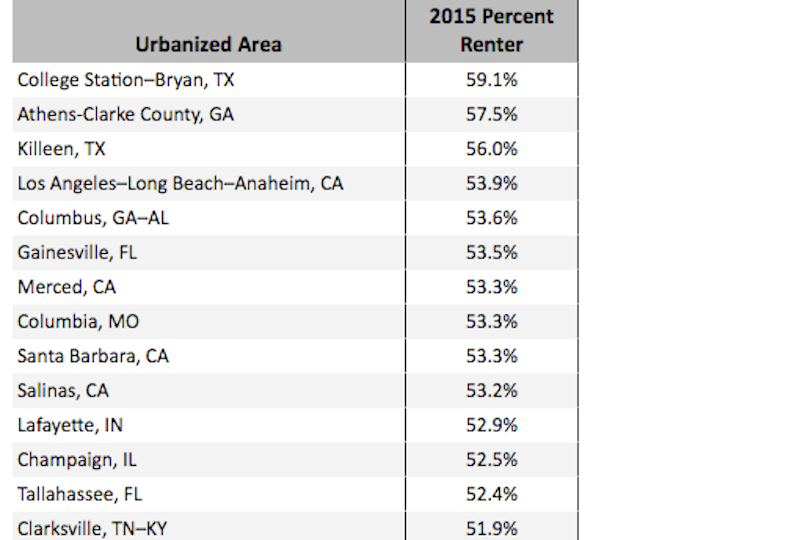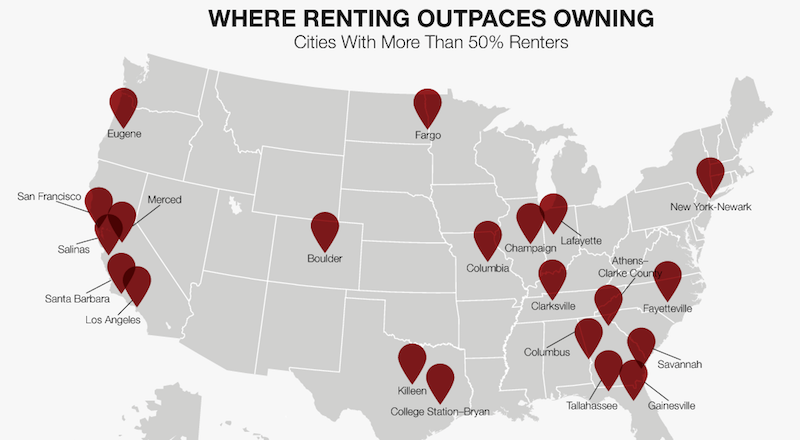Quick quiz: Which city has the highest percentage of renters: Chicago, Miami, or College Station, Texas? Believe it or not, it's College Station, with 59.1% renters. Chicago and Miami are both predominantly homeowner cities. Chicago has only 36.1% renters, Miami, 41.49%.
Of more than 400 urbanized areas around the country with a population greater than 100,000, just 21 are composed of at least 50% renters, according to data from the U.S. Census Bureau's 2015 American Community Survey. The full report was compiled by ADOBO and is based on data from The U.S. Census Bureau’s 2015 American Community Survey about occupied housing units in Urbanized Areas with a population of at least 100,000.
Not far behind is Athens-Clarke County, GA, with 57.5%, and Killeen, TX, with 56.0%. Other somewhat surprising cities include Columbus, GA (53.6%); Clarksville, TN (51.9%); Fayetteville, NC (51.2%); and Fargo, ND (50.2%). A number of big cities do make the list of majority rentals. Most housing units (53.9%) in the Los Angeles area are rented, not owned. The same goes for New York (50.7%) and San Francisco (50.9%). Five California cities make the list, more than any other state.
Many of the nation’s largest cities are unexpectedly absent from this list. Dallas, Houston, Washington, D.C., and Philadelphia are still dominated by homeowners. Both Dallas and Houston are hovering around the 43% renters' mark, while Washington, D.C., is 40.42% and Philadelphia is just 33.8% renters.
WHO'S RENTING, WHO OWNS A HOME?
A cursory glance at the age or renters hews to conventional wisdom, according to the ADOBO report. The majority of renters in the list of 21 renter-dominated cities are under 44 years old, with the highest percentage (24.29%) falling between the ages of 25 and 34. Owners tend to be older — 77.16% are over 45.
But a closer look at the age breakdown reveals some interesting divisions, especially on the renting side. In renter-dominated cities, the percentages are more equally spread across age groups for renting than for owning a home. Although over 50% of renters are 15 to 44 in age, a sizable percentage are older: 18.62% are 45 to 54, and another 14.13% are 55 to 64. A higher percentage of renters are 65 to 74 (8.32%) or 75-plus (6.96%) than 15 to 24 (5.9%).
These are all demographic factors that developers of rental apartments and condominiums - and their design and construction teams - need to keep in mind as they pursue future multifamily projects.

Related Stories
| Feb 8, 2012
Nauset completes addition and renovation for Winchester senior living community
Theater, library, fitness center, and bistro enhance facility.
| Jan 3, 2012
Rental Renaissance, The Rebirth of the Apartment Market
Across much of the U.S., apartment rents are rising, vacancy rates are falling. In just about every major urban area, new multifamily rental projects and major renovations are coming online. It may be too soon to pronounce the rental market fully recovered, but the trend is promising.
| Dec 27, 2011
Ground broken for adaptive reuse project
Located on the Garden State Parkway, the master-planned project initially includes the conversion of a 114-year-old, 365,000-square-foot, six-story warehouse building into 361 loft-style apartments, and the creation of a three-level parking facility.
| Dec 12, 2011
Mojo Stumer takes top honors at AIA Long Island Design Awards
Firm's TriBeCa Loft wins "Archi" for interior design.
| Dec 5, 2011
Gables Residential brings mixed-use building to Houston's Tanglewood area
The design integrates a detailed brick and masonry facade, acknowledging the soft pastel color palette of the surrounding Mediterranean heritage of Tanglewood.
| Dec 2, 2011
What are you waiting for? BD+C's 2012 40 Under 40 nominations are due Friday, Jan. 20
Nominate a colleague, peer, or even yourself. Applications available here.
| Dec 2, 2011
Goody Clancy awarded Ohio State residential project
The project, which is focused on developing a vibrant on-campus community of learning for OSU undergraduates.
| Nov 29, 2011
Suffolk Construction breaks ground on Boston residential tower
Millennium Place III is a $220 million, 256-unit development that will occupy a full city block in Boston’s Downtown Crossing.
| Nov 15, 2011
Suffolk Construction breaks ground on the Victor housing development in Boston
Project team to manage construction of $92 million, 377,000 square-foot residential tower.
| Nov 15, 2011
Miller joins Perkins Eastman as regional manager, Middle East and Northern Africa
Miller joins Perkins Eastman with more than 48 years of experience in architecture, design management, and construction administration for planning and infrastructure.
















